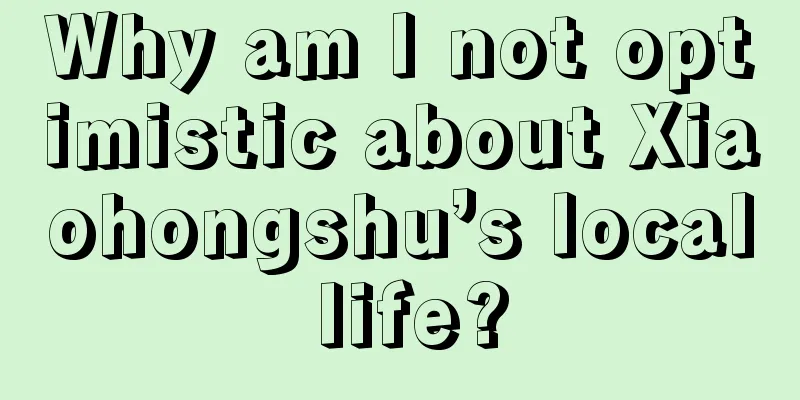Why are major e-commerce platforms canceling pre-sales?

618 is coming, and this year, a new change has occurred in the e-commerce industry - major e-commerce platforms have announced the cancellation of pre-sales. Taobao Tmall, JD.com, Kuaishou and other platforms have joined the ranks of this change, and it is expected that other platforms will follow suit soon. From the time when Taobao first introduced the pre-sale mechanism, which became a tried-and-tested strategy for all major promotions, to its abandonment today, it has only been over a decade, and this reflects the profound changes in the e-commerce industry. Why did major platforms launch pre-sales in the first place? What kind of vitality did the pre-sale model inject into e-commerce promotions? And why do they choose to abandon this once "magic weapon"? This article will discuss these issues. 01 Why did Taotian start pre-sale?Around 2010, Taobao was at its peak, with the platform's GMV rising continuously during the big promotion period, creating many sales miracles in the e-commerce industry. However, with the surge in order volume, the platform faced huge inventory management and logistics pressure. In 2012, in order to meet this challenge, Taotian introduced the pre-sale model for the first time. This move not only solved many practical problems for the platform, but also brought many benefits. 1. Inventory managementThe pre-sale model is essentially a C2M business model that allows merchants to reasonably arrange production and inventory based on consumers' deposit payments. This model gives merchants more time to prepare goods, thus avoiding the problem of delayed delivery caused by excessive sales during previous promotions. Through pre-sales, merchants can more accurately predict market demand and reduce the risk of excess inventory. At the same time, they can also alleviate logistics pressure to a certain extent and ensure that consumers have a smoother shopping experience during the promotion period. 2. Fund FlowThe pre-sale mechanism also provides merchants with an opportunity to recover funds in advance. Before the big sale, the deposit paid by consumers allows merchants to see their potential future income. With this income potential, merchants are confident that they can use the same funds for raw material procurement, production expansion or marketing, thereby gaining a favorable position in the fiercely competitive market. In addition, the funds to be recovered also reduce the financial risks of merchants during the promotion period. 3. Market testingPre-sales also play an important role in market testing. Merchants can use pre-sales to evaluate the market acceptance of products and adjust marketing strategies in a timely manner. If a brand launches a new product during a big sale, the merchant can judge whether the product is popular based on pre-sales. If the response is enthusiastic, production can be increased to meet market demand. If the market response is mediocre, product features or marketing strategies can be adjusted in a timely manner to make product improvements. This method not only helps businesses reduce the uncertainty of marketing, but also makes resource allocation more efficient and accurate. 4. Promote consumptionTaotian was the first to launch the pre-sale mechanism, the essence of which was to enhance consumer experience, increase the attractiveness of the platform, and promote GMV. From the perspective of consumer psychology, it also drives consumption in this way. The pre-sale + final payment method uses the Zeigarnik effect to deepen their memory of this event. The Zeigarnik effect, also known as the Zeigarnik effect, refers to the fact that people are more likely to remember unfinished or interrupted things than completed things. To sum it up in one sentence: If you keep thinking about it, there will be a response. The consumer first paid a deposit during the pre-sale, but had to wait at least a week before paying the balance. During this week, he was always thinking about it and would check the goods he paid the deposit for every day, which virtually increased the platform's traffic and the possibility of buying other goods. This feeling could only be relieved after he paid the balance a week later. Because consumers paid a deposit during the pre-sale period, their attention and memory of the platform increased by one week, which increased the platform's traffic and created more sales possibilities. 02 Why have all platforms cancelled pre-sales?As time comes to 2024, the competitive landscape in the e-commerce field has undergone tremendous changes. In order to compete for market share, platforms such as Taobao Tmall, JD.com, Pinduoduo, Douyin, and Kuaishou are constantly innovating and launching various innovative marketing strategies and service models. Pinduoduo, in particular, quickly won market favor with its low-price strategy and consumer-friendly policies such as "refund only", and its successful experience was followed by other e-commerce platforms. These changes have forced all platforms to re-examine their business models and service strategies, realizing that in this competition, winning consumers' trust and satisfaction is more important than simply attracting merchants. As the pre-sale mechanism has accumulated more and more negative effects due to complex rules, long delivery time and other issues, major platforms have decided to cancel pre-sales and return to a simple and direct sales model to improve consumer experience and enhance the platform's competitiveness. Canceling pre-sales today has more advantages than disadvantages. Here are the reasons why the platform cancels pre-sales. 1. Simplify the shopping processThe complexity of pre-sale rules often confuses consumers. In order to get a little discount, consumers have to spend a lot of time and energy to understand the rules, which greatly weakens the fun of shopping. Canceling pre-sales will make shopping simple and direct, which is more in line with current needs. At the same time, under the pre-sale model, consumers often have to wait a long time before receiving the goods, which runs counter to the fast and convenient service characteristics of the e-commerce industry. After purchasing a product, consumers naturally hope to receive it as soon as possible. Long waits can make people feel tortured. Canceling pre-sales will allow consumers to get the product faster, which is undoubtedly more in line with the current consumer demand for instant gratification. 2. Avoid price-related dissatisfactionPrice is one of the factors that consumers pay most attention to during sales. During the pre-sale period, consumers often need to pay a deposit in advance, but sometimes they will find that on the 618 day, the price of the goods is lower than during the pre-sale period, which will undoubtedly make consumers feel that they have "lost a price." Even if the pre-sale price is the same as the price on the day of the big sale, since the pre-sale goods will not be shipped until the end of the event, consumers will feel that they have paid in advance but have not enjoyed the convenience of receiving the goods in advance. This difference in experience will also affect their satisfaction with the platform. Canceling pre-sales can avoid these problems caused by price and time differences, and make consumers feel that they are enjoying a fairer and more transparent shopping environment during the promotion period. 3. Reduce returns and refundsAfter the first wave of pre-sales in previous years, “refund” would always become a hot topic. After a few days of thinking, many people found that they didn’t need the things they bought at the time. "Refund" is a hot search, which is a manifestation of "buyer's remorse". In the scene of big sales, we are always urged to buy some products. You think these products will bring you new changes, but many times, the result is that you feel extremely regretful for the impulse purchases. This regret after impulse buying, coupled with the cumbersome return process, seriously affects consumers' shopping experience. After canceling pre-sales, consumers can make purchasing decisions more rationally, reduce impulse shopping, reduce return rates and refund disputes, and improve shopping satisfaction. 4. Adapt to normalized low-price competitionIn the current e-commerce competition landscape, Pinduoduo's 10 billion yuan subsidy, Douyin and Kuaishou's live streaming sales, and other models have turned the low prices of big sales into a normal state. This normalized low-price competition has weakened the appeal of traditional big sales, and consumers no longer have high expectations for discounts during big sales as in the past. The e-commerce industry has also entered an era of stock competition, with competition between platforms focusing more on price advantages. At this time, platforms must compete with real swords and guns without reservation. Canceling pre-sales and selling directly at low prices has become an inevitable choice for e-commerce platforms to survive and develop in the involutionary competition. 5. Consumption downgrade, pre-sale can no longer drive salesAgainst the backdrop of consumption downgrade, consumers' willingness and power to buy have declined. In the past, pre-sales, as a promotional tool, could effectively stimulate consumers' desire to buy, but nowadays, consumers have become more rational and cautious, and are no longer so sensitive to pre-sales, a shopping method that requires a deposit in advance. Consumers are more inclined to make purchases based on actual needs rather than being driven by promotional activities. The pre-sale mechanism can neither effectively drive incremental sales nor easily cause dissatisfaction and complaints from consumers, so there is no need for this mechanism to exist. 03 ConclusionPre-sale is a promotional method launched by e-commerce platforms in specific periods. It has only existed for a dozen years since it was first introduced by Taobao Tmall in 2012. Initially, the pre-sale mechanism brought a series of benefits to e-commerce platforms: it helped merchants lock in sales in advance, effectively manage inventory, recover funds in advance, and optimize product strategies through market testing. These advantages once made pre-sales an indispensable part of e-commerce promotions. However, with the continuous changes in the consumption environment and the increasing competition in e-commerce, the pre-sale mechanism has gradually exposed a series of problems. Complex rules, long waiting times, high returns and refunds, and consumer dissatisfaction with pre-sale prices have gradually eroded consumers' shopping experience. As the e-commerce industry enters an era of stock competition, low-price strategies and instant gratification have become new consumption trends, and the attractiveness and competitiveness of pre-sales have continued to decline. Under such circumstances, the pre-sale mechanism failed to bring the expected sales growth to the platform. Instead, it was criticized by consumers due to various drawbacks, bringing negative effects. Therefore, its historical mission naturally came to an end. Author: Xunkong Source public account: Xunkong’s Marketing Revelation (ID: 846631) |
>>: Such a vicious Mother's Day copywriting
Recommend
In-depth analysis of the application skills of "anchoring effect" in marketing
The "anchoring effect" is a very famous ...
Can Shopee sell sexy lingerie? How to sell sex toys?
There are many products that can be sold on the Sh...
Cheng Shian stopped updating, Luo Wangyu "crashed": Why is the beauty and cosmetics track declining?
From the hottest track to the current situation wh...
These three sets of copywriting are so beautiful
These three sets of copywriting were written with ...
6 new marketing trends to teach you how to tell a good brand story
In the first half of 2023, the consumer market gra...
I deleted all the content, so the data increased?
How can designers optimize copywriting and interfa...
Douyin’s anti-counterfeiting campaign is very popular, but I advise you not to do it!
Have you seen the popular shopping videos that fig...
Don’t overestimate the “store broadcast era”
This article will explore the rise of Dianbo and t...
How to run Amazon variation ads? Should I turn them off?
Some of the merchants that open stores on Amazon a...
Luckin Coffee’s way of survival: “speed” is the only way to survive
This article starts from the three aspects of Luck...
Don’t fall into the “self-employment trap” unless you have these 6 abilities
In today's era full of opportunities and chall...
What we really need is "profitable growth"
There are several obvious changes this year. Have ...
OpenAI, Google, and Apple reignite the battle for AI supremacy. Who will be the king of the "Her" era?
OpenAI, Google, and Apple are all betting big on A...
Why are young people so keen on “finding a partner”?
What is the hookup culture? Why do young people lo...
Why do Chinese platforms dominate Korean live streaming e-commerce?
"The rise of Korean e-commerce on Chinese pla...









